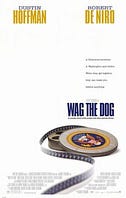I rewatched Wag the Dog (1997) after having seen it more than twenty years ago. I remembered just the broad strokes of it involving creating a distraction away from a president’s sex scandal. Someone in one of my prior movie posts recommended it as a dissident film; I was skeptical of this given the liberal cast involved (Robert de Niro, Dustin Hoffman, Willie Nelson, William H. Macy etc. and Anne Heche, who would later go on to die in a strange way by getting in a car accident and bursting out of a body bag on camera) but I gave it a re-watch anyway. I saw on the Wiki page that the movie came out before the Lewinski scandal and Clinton’s subsequent bombings in the Middle East, which made it prescient from the start.
It’s an amazing film, a true dissident film, but not in the way most people saw it. The way most people saw it was that narratives can be created to distract or manipulate the public for hidden purposes. Fair enough and cynical, true. But the deeper message is that narratives can be created out of nothing, with no pushback from anyone else other than other elites like spooks. Government works with Hollywood to craft the best and most memorable narratives, which reminds me of the rumor that Kubrick directed the moon landings. It is cynical ultimately not about narrative creation but how people unquestioningly believe what they are told. It is extremely pessimistic from that respect - not against government, but against human nature and the gullibility of plebs. Megan Garber’s look back at the film in 2016 for The Atlantic was correct, where she wrote: “It’s a common trope in films and shows about politics: the one person, standing up to the Hollywood-produced machinery of Washington. The individual, fighting for authenticity in a political culture that wants nothing more than to be fake. What Wag the Dog suggests, though, is something both gentler and infinitely more cynical: Here, there is no one to push back. Here, there is no one to stand up for authenticity or truth or the empowerment of the individual. Here, it’s all a production; we citizens double as audiences. And the thing of it is that, in the movie’s dark vision, there is no difference between the two.”
From: web.archive.org/web/202…
The film also foreshadowed what we are experiencing today: the “post-truth world” where it has become unclear how one can tell fact from fiction given the loss of credibility of official institutions and experts. This is why it is so important to have a grounding mechanism to test narratives against reality, as well as to step back from day-to-day media narratives because even to hear them is to imprint their framing in your mind. Your attention is the product.
The script by David Mamet sparkles; it’s based on a novel but apparently it didn’t have too much to do with it. Mamet’s Glengarry Glen Ross also featured amazing dialogue. I’m going to have to watch more of his works.
9.5/10.


